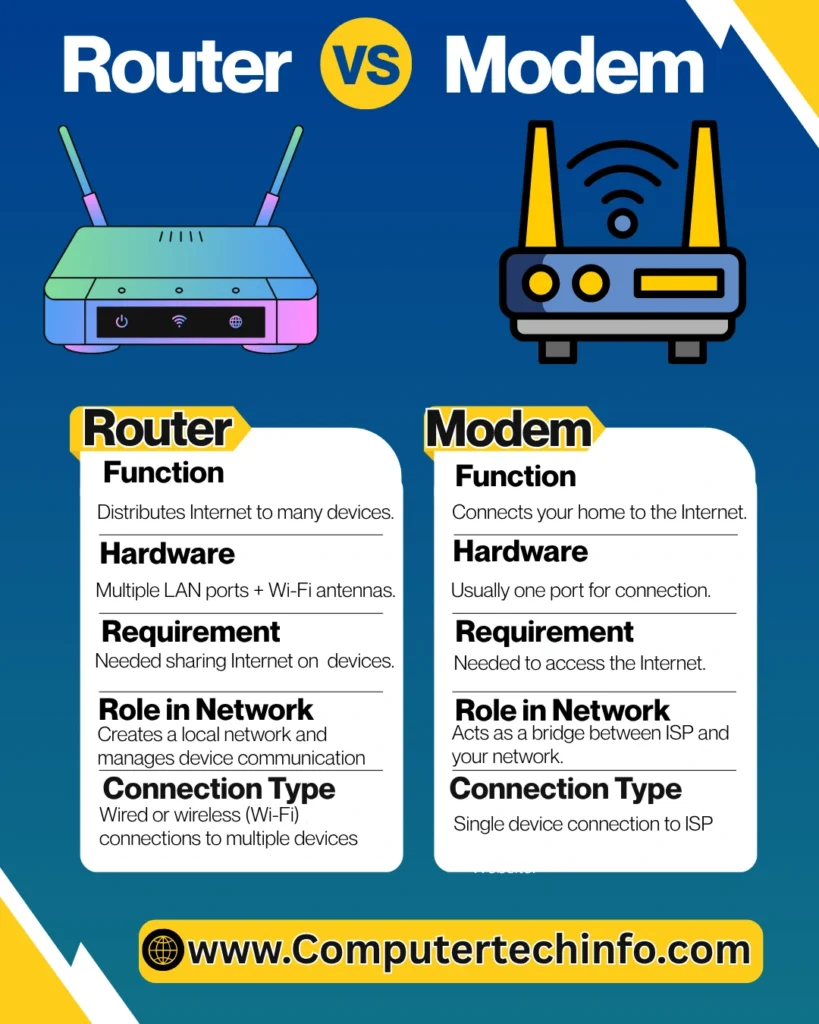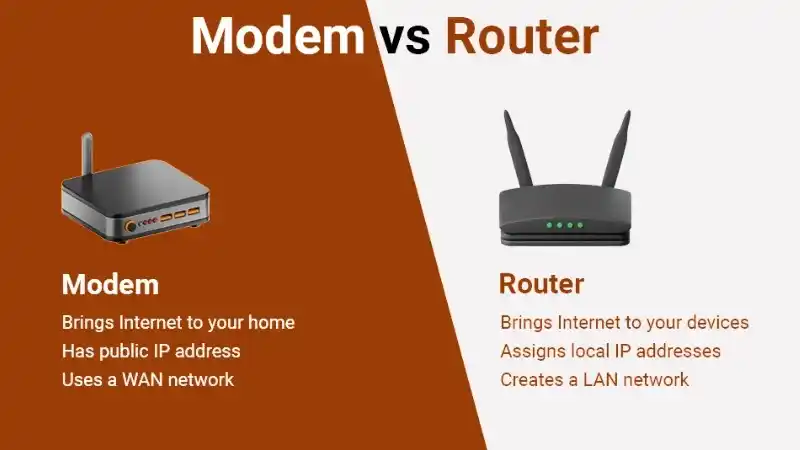Have you ever asked yourself, “What’s the difference between modem and router simply place? Modem deliver the Internet into your home, while a router shares that Internet with all your devices? The modem connects your home network to your Internet Service Provider (ISP), and the router extension that connection so your phones, laptops, and smart gadgets capable of all go online.
A few years ago, modems and routers were our gateways to the digital world, secure faster and more powerful with each passing year. Today, it’s hard to imagine a single day without relying on these trusting to stay connected. While most of us depend on our home networks to entry the Internet, many people don’t fully know how these networks actually work.
Although modems and routers serve different roles, it’s important to know how they differ. From this blog, our team will try to explore all key differences between a modem and router.
Do I Need a Modem and Router?
A modem and a router are both key parts of most home networks, especially like anyone working from a home office. The modem control sending and receiving data from your Internet service provider (ISP), speed the router shares that connection with all the devices on your network.
Modem allows connecting to the router, which then links to all the devices in your home. Both the modem and router are crucial like a stable and reliable Internet connection.
Without a modem, your router can’t way in the Internet. And, without a router, your devices can’t be able to communicate with every one other.
What is Modem-Router Combo?
A modem-router combo refers to mixture the purpose of both devices into a single unit. These all-in-one gadgets are commonly offered by your Internet Service Provider (ISP).
Pros
Set up with ease
Just need fewer cables and devices
Cons
Difficult to get upgrading individual components
Get less perform as well under heavy network load
Basic Difference between Modem Vs Router Speed
It’s not really regarding select between a modem and a router. Your router upset the upload and download speeds you receive like your modem, Ago it divides the link between all the devices on your network.
If you connect a device directly to your modem, you’ll probably receive faster speeds. Using a router capable of a little reduce this speed, but usually not by much.
Regardless, if your router doesn’t support high-speed connections, your modem’s speed won’t build a difference. It’s smart to use a router that capable of handle the speeds your modem provides.
In small, your modem is important, but it depends on a good router to execute at its best. That’s why select the right broadband provider matters. Hyperoptic delivers superfast, good speeds of up to 900Mbps. Switching is simple check if your postcode is eligible like our service and gets connected, even if you’re still under contract with another provider.
Modem Vs. Router: Detailed Comparison
Let’s clearly know the differences between routers and modems by looking at them like different angles.

Core Purpose
Modem: A modem connects your home network to the Internet between your Internet Service Providers (ISP). Think of it as a translator it converts the data like your computer into a form that capable of travel between the ISP’s cables. Sending data this way is called inflection, and converting it back into computer-readable form is called detection.
Router: A router connects all your devices in a home that allow them communicate with each other over internet. Imagine of it as a traffic manager, directing data between your devices and the modem to recall everything running smoothly.
Connectivity
Modem: A modem attach directly to your Internet Service Provider (ISP) using a cable like coaxial like cable internet, a phone line alike DSL, or fiber like fiber internet. It usually has one port for the ISP and one Ethernet port to connect also a computer or a router.
Router: A router connects to the modem on one side and links multiple devices like computers, smart phones, tablets, and smart TVs on another. Devices capable of connect also Wi-Fi or with Ethernet cables. A modem-router combo builds this setup easier by combining both functions in one device.
Network Scope
Modem: A modem links your home network (LAN) to the internet (WAN), allowing your devices to way in online services and websites.
Router: A router works general within your home network (LAN), control data traffic between your devices and also between your network and the modem.
Signal Translation
Modem: A modem converts data so it capable of travel over different types of internet cables like cable, DSL, or fiber by performing modulation and detection.
Router: A router doesn’t change signals it simply directs digital data packets between your devices and the modem.
Traffic Management
Modem: A modem sends the internet signal as it is and doesn’t control or direct single data packets to specific devices on your network.
Router: A router sends data to the right place by reading each packet’s destination. After that, it will take decision to drive the best path to deliver it on your local network.
Built-in Protection
Modem: A modem generally doesn’t involve security qualities because its main job is just to connect your network to the internet.
Router: A router includes security qualities like firewalls, Wi-Fi encryption, and at times parental controls or VPN support. Since it control data within your network and directs it to the right devices, securing your network secure is important.
OSI Model Layer
Modem: A modem mainly works at the physical level when join to the ISP and at the data link level when connect with your home network.
Router: A router mainly works at the network layer, control data packets between different networks. While it also deals with bottom layers to send the data, its main job is at Layer 3.
IP Address Assignment
Modem: A modem gets one IP address from your ISP that is visible on the internet. It is unable to get IP addresses to the devices in your local home network.
Router: But, router easily assigns a unique private IP address to each device on your network by using DHCP.
Necessity
Modem: A modem is needed to take the internet signal from your service provider (ISP) into your home network.
Router: A router allows multiple devices connect to the internet at the same time. It also creates a Wi-Fi network or a local network so your devices capable of connect with each other.
Basic Difference between Router and Switch in Tabular Form
Here’s a table clearly shows the main differences between a modem and a router.
| Feature | Modem | Router |
| Function | Converts signal between your ISP and devices | Manages and distributes data to devices on your network |
| Connection Type | Connects to ISP via Cable, DSL, Fibre, etc. | (WAN) Connects to modem and devices (LAN) |
| Signal Conversion | Converts analog signal from ISP to digital signal for devices and vice versa | Does not convert signals |
| Data Routing | Does not route data | Routes data packets to specific devices on the network |
| Security | Limited security | Offer features like firewall and WPA encryption |
Both works together to give let you internet world to your device seamlessly. The modem has objective to transfers the signal, but the router just shares it with your networking devices. Without one, you are not capable to access internet properly.
Conclusion
To sum up, understanding how a modem and router work helps you know their key differences. A modem works like a translator; it converts the internet signal from your service provider into a form your home network capable of use.
But, router directs broadcast data and shares the internet; then allow all your devices to make connection with each other.
Therefore, both modems and routers consist the enhanced key like modern homes, and shaping how we get access internet and manage our home networks.




